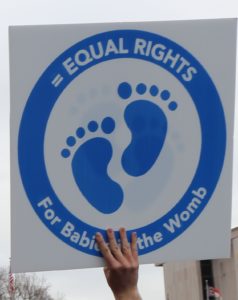Voting and the Lesser of Two Evils
With the U.S. elections a few days away, questions tend to arise among well-meaning Catholics about whether they can vote for any candidate who in some way supports abortion.
As a result, they consider whether they should vote at all if there is not a completely pro-life candidate, or if it worth voting for a non-viable third-party candidate who is most aligned with the Church’s moral and social teachings. Some would argue that not voting or voting third party only serves to help the worse of the two viable candidates, and that Catholics are morally obligated to utilize their votes to prevent that from happening.
While this is something to take under serious prudential consideration, especially when someone senses his vote is more ”against” one candidate than “for” another, the Church leaves an individual with freedom in this regard and provides the moral principles to guide the decision.
One thing that needs to be kept in mind is that there is a hierarchy of moral evil; some acts are worse than others.
The Church posits that there are five “non-negotiables” when it comes to deciding on a candidate to endorse: abortion, euthanasia, embryonic stem cell research, human cloning, and the redefinition of marriage.
The first four involve the direct and willful destruction of innocent human life; the fifth one militates against the very institution upon which society depends for its continued existence.
While there are other evils, these five must be considered first when deciding whom to vote for as well as which political party to endorse. Candidates aspiring to national office would be expected to execute the party’s platform (this may or may not be as pronounced at local-level elections). Regarding the political parties, it can be well-argued that if a party’s platform officially endorses all or most of the non-negotiables, a Catholic cannot be aligned with it without committing sin, as doing so could be considered formal cooperation with evil.
So the question arises about what to do when two viable candidates for a national office, either personally or by party affiliation and endorsement, violate one or more of the non-negotiables.
In such cases, a Catholic may vote for the lesser of the two evils.
But how to determine that?
 We must keep in mind that a Catholic can never formally cooperate with abortion; he cannot support it or vote for a candidate because the candidate will support it. That said, given the hierarchy of the non-negotiables, a candidate (or party) that supports abortion is the worse of the two, even should the other support some of the lower ones but not abortion (for instance, when a candidate is against abortion but may favor research on already existing stem cells from aborted embryos).
We must keep in mind that a Catholic can never formally cooperate with abortion; he cannot support it or vote for a candidate because the candidate will support it. That said, given the hierarchy of the non-negotiables, a candidate (or party) that supports abortion is the worse of the two, even should the other support some of the lower ones but not abortion (for instance, when a candidate is against abortion but may favor research on already existing stem cells from aborted embryos).
A candidate should be eliminated from consideration if he fails at this point. As Trent Horn comments in his article Can Catholics Vote for Pro-Choicers? which should be read in its entirety (https://www.catholic.com/magazine/online-edition/faith-abortion-and-voting-part-4) :
“If the only relevant difference between two candidates were that one supports the legal killing of unborn human beings and the other does not, then there would be almost no chance there is a proportionate reason to vote for the pro-legal-child-killing candidate.”
Nonetheless, if both support abortion, one would need to see which other non-negotiables are compromised, and a vote would be decided based on who is less likely to advance the evil causes at hand.
Some Catholics may still find themselves torn though. While much emotion and passion surrounds the elections, revealing a polarized and divided electorate, we are responsible before God for making a reasoned, dispassionate, and morally correct decision about whom we vote for.
As Horn states:
Catholics could not vote for a candidate who endorses an intrinsic evil such as legal abortion merely because they prefer that candidate’s party or because they find the other candidate unlikeable or even morally reprehensible in his personal conduct. And as we noted last time, voting for a pro-abortion candidate also wouldn’t be justified merely because you disagreed with the other candidate’s views on an issue Catholics could reasonably disagree about.
The Church’s moral guidance does well to help us eliminate a person whom a Catholic cannot morally vote for, leaving us free to vote for the remaining candidates.
But given the serious situation facing the country, it is also worth considering: does a circumstance exist in some places that should make one think carefully before voting for a third party?
October 30, 2020








